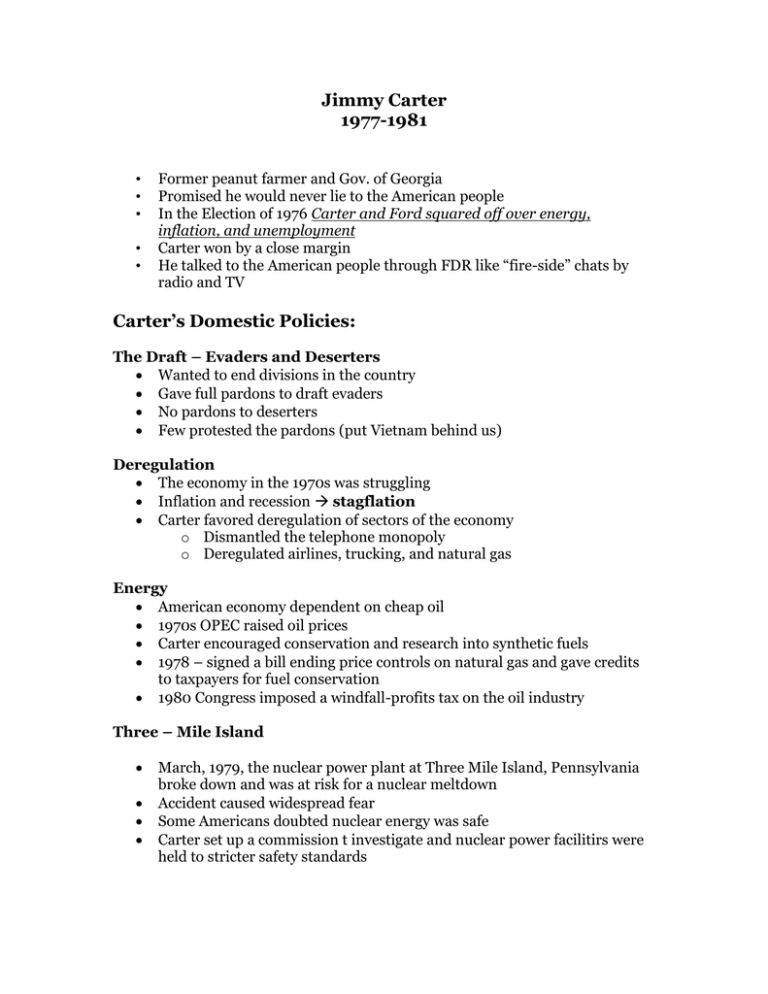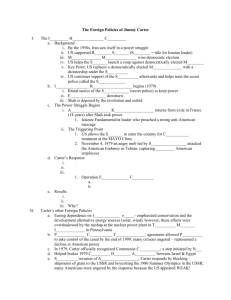Jimmy Carter 1977-1981
advertisement

Jimmy Carter 1977-1981 • • • • • Former peanut farmer and Gov. of Georgia Promised he would never lie to the American people In the Election of 1976 Carter and Ford squared off over energy, inflation, and unemployment Carter won by a close margin He talked to the American people through FDR like “fire-side” chats by radio and TV Carter’s Domestic Policies: The Draft – Evaders and Deserters Wanted to end divisions in the country Gave full pardons to draft evaders No pardons to deserters Few protested the pardons (put Vietnam behind us) Deregulation The economy in the 1970s was struggling Inflation and recession stagflation Carter favored deregulation of sectors of the economy o Dismantled the telephone monopoly o Deregulated airlines, trucking, and natural gas Energy American economy dependent on cheap oil 1970s OPEC raised oil prices Carter encouraged conservation and research into synthetic fuels 1978 – signed a bill ending price controls on natural gas and gave credits to taxpayers for fuel conservation 1980 Congress imposed a windfall-profits tax on the oil industry Three – Mile Island March, 1979, the nuclear power plant at Three Mile Island, Pennsylvania broke down and was at risk for a nuclear meltdown Accident caused widespread fear Some Americans doubted nuclear energy was safe Carter set up a commission t investigate and nuclear power facilitirs were held to stricter safety standards Civil Rights Carter appointed more women and African Americans to his administration than any other previous administration Appointed Andrew Young as US Ambassador to the UN Although in Bakke vs. the University of California an affirmative action program was ruled unconstitutional Carter’s foreign policy: Human Rights President Carter believed most of the world’s problems could be cured if human rights were respected He made human rights the centerpiece of his foreign policy Publicly criticized the Soviet Union and South Africa for their humanrights policies Most countries that violated human rights no longer received U.S. foreign aid Criticism of his policy? o Naïve o Harmed vital U.S. interests in the world o Too selective in his criticism of some countries Panama Canal Treaty Panama Canal Treaty gave the canal back to panama on December 31,1999 Carter approved the treaty Republican conservatives opposed the treaty Senate ratified in 1978 Camp David Peace Accords Israel founded in 1948 Egypt refused to acknowledge Israel’s right to exist 1977 Anwar Sadat (Egypt) traveled to Israel and proposed peace talks By 1978 talks were at an impasse Carter invited Anwar Sadat and Menachem Begin to Camp David For 13 days, the three leaders negotiated Two agreements were signed o Set conditions for general peace talks in the Middle East o Conditions for peace between Egypt and Israel o 1979 – a peace treaty was signed between Egypt and Israel Soviet Union 1979 attempted to improve on SALT I by negotiating SALT II and imposing additional limits on certain nuclear weapons Conservative Republicans and Democrats opposed SALT II – it died in the Senate China Carter formally recognized the People’s Republic of China as the sole legitimate government of China 1979 trade and cultural contacts between the U.S. and the PRC increased Afghanistan Hotbed of Islamic fundamentalism 1979 – militants kidnapped the U.S. ambassador in Kabul – he was later killed – Carter cut off U.S. aid There was a Soviet backed government installed in Afghanistan S.U. wanted to protect the government against fundamentalists and invaded Carter protested the invasion 1980 – Carter tried to isolate the S.U. Suspended gain and high-technology sales to the Soviets Boycotted the 1980 Olympic Games in Moscow along with 60 other countries Carter’s policy was unpopular o Farmers in Midwest hurt by the embargo o Athletes denied the opportunity to compete o Ineffective – did not force Soviets out Iranian Hostage Crisis In 1950s the U.S. restored the Shah of Iran to his throne Shah supplied the U.S. with cheap oil and purchased millions of dollars of U.S. weapons 1978 Shah was overthrown by a Islamic fundamentalist movement led by the Ayatollah Khomeini (a radical Moslem cleric) The Shah became seriously ill – no western country would admit him President Carter relented and allowed the Shah to enter the U.S. for cancer treatment Nov. 4, 1979, Khomeini’s followers seized the U.s. embassy in Tehran taking 52 hostages Demanded extradition of the Shah to Iran for trial – Carter refused Carter – expelled Iran’s diplomats, froze Iranian assets, banned U.S. imports of Iranian oil, and imposed economic sanctions Crisis dragged on through the winter of 1980 Khomeini became a hated figure in U.S. Yellow ribbons symbolized captivity April 24, 1980 – Carter ordered a military rescue of the hostages – the mission failed when two helicopters collided, and 8 servicemen died. Shah went to Egypt and died in July, 1980 Hostages released on January 20,1981 – held for 444 days
